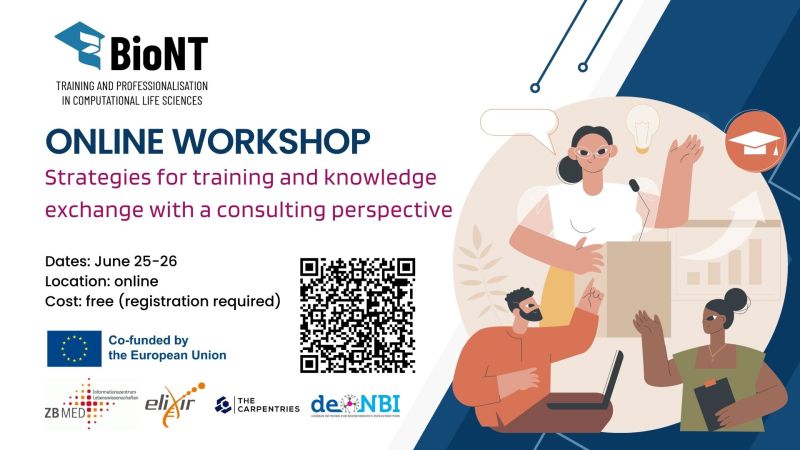
- This event has passed.
Strategies for training and knowledge exchange with a consulting perspective

BioNT – BIO Network for Training – is an international consortium of academic entities and small and medium-sized enterprises (SMEs). BioNT is dedicated to providing a comprehensive training program and fostering a community for digital skills relevant to the biotechnology industry and biomedical sector. With a curriculum tailored for both beginners and advanced professionals, BioNT aims to equip individuals with the necessary expertise in handling, processing, and visualising biological data, as well as utilising computational biology tools. Leveraging the consortium’s strong background in digital literacy training and extensive network of collaborations, BioNT is poised to professionalise life sciences data management, processing, and analysis skills.
This hands-on workshop will introduce you to essential training theory, needs assessment techniques and effective delivery strategies in training and consulting, followed by an introduction to consulting with a focus on bioinformatics. You will explore the theory of learning, emphasising how people learn, followed by practical teaching techniques, learner-centred instruction, and creating an inclusive classroom environment. Its primary emphasis lies in hands-on teaching methods, constructive alignment, formative assessment, and providing valuable feedback to learners. Additionally, the workshop will highlight other knowledge-exchange formats, like consulting and mentoring, offering insights into the interface between industry and academia, and how bioinformaticians can leverage their skills in related roles.
BioNT offers a two-day workshop with the primary aim of introducing participants to good enough practices for teaching and consulting.
On the first day, participants will dive into the theory of learning, drawing upon The Carpentries material to provide a solid foundation. This includes an introduction to evidence-based teaching practices, equipping participants with strategies grounded in research to enhance their instructional effectiveness. The workshop also focuses on creating a positive environment for learners, offering practical guidance on fostering inclusivity and engagement during workshops. Furthermore, participants will have ample opportunities to practise and refine their teaching skills through hands-on activities and group discussions. This allows participants to gain valuable experience and confidence in their instructional delivery. In addition, the workshop will also cover training development and surveying training needs. Participants will learn how to assess the learning needs of their target audience and make informed decisions on training content and delivery methods. Exercises will be conducted to guide participants through the process of surveying training needs and developing collaborative training materials within the community.
On the second day of the workshop, we broaden the scope to include other forms of knowledge transfer, such as consulting and mentoring. Participants will dive deeper into how to communicate efficiently by focusing on refining their delivery style, tone, and pacing to optimise learner or consultee engagement and comprehension. Emphasis will be placed on integrating feedback to continually improve the learning experience and meet the diverse needs of learners and consultees. In addition, participants will explore strategies for effectively teaching technical knowledge using the proven BioNT training format, known for its structured and hands-on approach. Through practical examples and exercises, participants will learn how to break down complex technical concepts into digestible modules and facilitate active learning experiences.
On the second half-day, participants will engage with key questions related to consultancy in bioinformatics, including how to technically keep track of tasks and document projects, the frequency and criteria for follow-up, initiation of new projects, delegation decisions, managing multiple consultancy sessions, handling unreasonable requests, prioritisation between projects, time management strategies, prioritisation of consultancy over general training, division of time among different activities, and defining the threshold between consultancy and research involvement.
